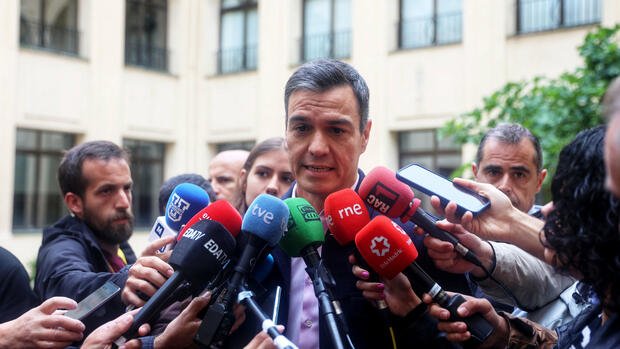Spain’s Prime Minister Pedro Sánchez of the Socialist Workers’ Party (PSOE) announced new national elections after he and his coalition partners lost the governing majority in regional and local elections in many places.
(Photo: dpa)
Madrid Spanish Prime Minister Pedro Sánchez on Monday announced new elections for July 23 in response to the defeat of his Socialists and their left-wing partners in Sunday’s regional and local elections. Twelve of the 17 Spanish autonomous regions (comparable to the German federal states) and 8,000 municipalities had voted in Super Election Sunday.
Sánchez’s PSOE party and its left-wing partners held the governing majority in ten of Spain’s twelve autonomous regions and wanted to defend them. Subject to the coalition negotiations, they probably only succeeded in three.
“I am personally aware of the results and I think it is necessary to give an answer,” Sánchez said on Monday. “The best thing is that the Spaniards are taking the floor to determine the political direction of the country,” said the prime minister in a brief appearance.
Sánchez himself had declared the election to be a test for the national elections, which were not due until the end of the year, and had spent weeks campaigning around the country. It was his first showdown with the new conservative opposition leader Alberto Núñez Feijoo – and Sánchez clearly lost.
The PSOE itself only lost a total of 400,000 votes. In many places, however, it no longer gets a majority. Because the left-wing coalition partners fared significantly worse, especially the national coalition partner Unidas Podemos.
The results of the left-wing populists suffered above all from the poor workmanship of one of their core projects: the reform of sexual criminal law. The reform resulted in scores of convicted sex offenders being released early from prison. Unidas Podemos himself blamed misogynist judges until coalition partner PSOE pulled the ripcord and pushed through a reform of the reform.
The strong economic growth does not help Sánchez
Even the better-than-expected economy didn’t help Sánchez. While Germany slides into recession, Spain grew by 0.5 percent in the first quarter. The EU Commission assumes that the EU’s fourth-largest economy will grow by 1.9 percent this year – almost twice as much as the EU average.
>> Read here: Why Germany is in recession – four reasons
An important driver is the booming tourism. Inflation in Spain at 3.8 percent in April was only around half the EU average. Chronically high unemployment is falling and at 13 percent is the lowest it has been since 2008.
This is also due to the numerous new public jobs that the government under Sánchez was able to create – including through aid of 140 billion euros from the European recovery fund after the pandemic. However, there are repeated indications that the funds are not arriving in the real economy, or only very slowly, partly because the administration is overwhelmed.
The entrepreneurs are not in good spirits with Sánchez anyway. With an excess profit tax for energy companies and banks, he has financed part of the increasing government spending through new corporate taxes.
The leaders of the Partido Popular (PP) celebrate the party’s victory.
(Photo: dpa)
In the regional and local elections, the conservative PP and the right-wing populist Vox primarily gained votes from voters who had previously voted for the young right-wing liberal Ciudadanos party. With these elections, Ciudadanos practically disappears from politics again. It failed mainly due to its own miscalculations and power struggles.
>> Read here: What Spain has to offer expats
In important regions like Madrid and Andalusia, the PP even won an absolute majority. Andalusia was a stronghold of the socialists for years. In future, the PP could also nominate mayors in five of the six largest cities in the country. In Madrid and Málaga with an absolute majority. In Seville, previously ruled by the PSOE, in Valencia and in Zaragoza with the help of the right-wing party Vox.
The right-wing populist party Vox is one of the clear election winners
Sánchez’s new challenger Alberto Núñez Feijóo tries to position the PP in the right center – but that is made difficult by Vox. Vox boss Santiago Abascal stressed confidently that his party had now become indispensable for the “fight against socialism and against communism”. Vox have finally established themselves as a nationwide force.
His right-wing populists emerged as a protest against the independence movement in Catalonia, which culminated in a banned referendum in 2017. During his tenure, Sánchez was dependent on the votes of pro-independence supporters from Catalonia and the Basque Country and made numerous concessions to them.
According to experts, these pacts have come as a bitter blow to many Spaniards. The Basque independence party Bildú put 44 ex-ETA terrorists on its list, seven of them convicted murderers.
The new PP boss Feijóo is a newcomer on the national stage in Spain. He was Prime Minister of Galicia until his appointment as PP chief in April 2022. In the politically highly polarized Spain, he uses the nimbus of fresh wind according to experts.
In polls for the national elections, his PP is ahead. In terms of content, Feijoo relies on tax cuts and a more business-friendly policy with less bureaucracy and a more agile administration as counterpoints to Sánchez.
More: How southern Europe is struggling with the climate crisis

